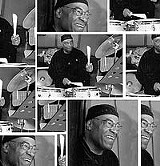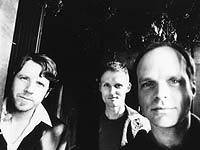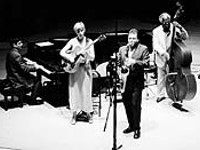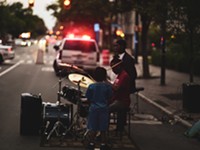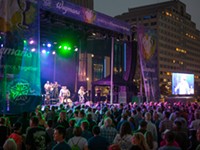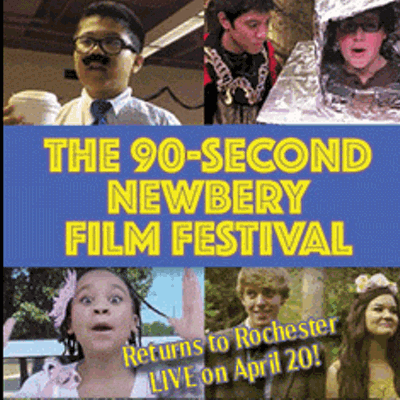[
{
"name": "500x250 Ad",
"insertPoint": "5",
"component": "15667920",
"parentWrapperClass": "",
"requiredCountToDisplay": "1"
}
]
When Rashied Ali was growing up in North Philadelphia in the 1940s and 1950s, he may have occupied the most fertile ground for the development of jazz talent anywhere on earth. His second cousins, Charlie and Bernard Rice, were both drummers playing gigs with an up-and-coming local saxophonist.
"I grew up on his music and didn't even know it," says Ali. "A lot of times he'd be in places playing with my cousins, and I didn't know who it was. I didn't know it was John Coltrane until I woke up one day and said, 'Who's this guy playing with Miles Davis like that?'"
Once he found out who Coltrane was, he sought out a deeper insight into the music.
"I knew where he lived; it was a neighborhood called Strawberry Mansion and I lived in the same neighborhood," he says. "I used to ride my bike down that way and I'd hear the saxophone coming out of the third floor window. I'd stick around and listen for a while and then split. But it was always happening, man! I mean, when he was home, all he did was practice, I guess, because I never went past that house ever and didn't hear the saxophone."
Ali had a feeling about that saxophone and, in 1965, after he had made his own mark on the drums with Sonny Rollins, Pharoah Sanders, and Don Cherry, he got the call for the ultimate job in jazz.
"Playing with Trane was something I always wanted to do," he says. "When I got close enough I really felt like it was going to happen anyway, because I listened to this cat my whole life and I really understood the music he was playing thoroughly and not only what he was playing, but stuff that he wouldbe playing. It was a phenomenal thing that happened to me."
Philadelphia was also a great town for drummers. In fact, one of the best took his nickname from the city.
"Philly Joe Jones was my main hero," Ali says, "because he was right there and he was the hippest thing I ever heard on drums."
Ali played in Philly r&b bands like Dick Hart & the Heartaches, but his heart wasn't in it. He gravitated toward jazz, and by 1963 he was touring Japan with Rollins.
When he returned, he moved to New York and immediately began playing with some of the most avant-garde players on the scene, including Sanders, Cherry, and another Philadelphian, Sonny Murray.
After his exposure to avant-garde music, Ali was determined to transcend swing. He can't quite pinpoint the roots of his innovative, uneven approach to drumming.
"I don't know what it was based on, 'cause I just came into playing it listening to Philly Joe Jones and Elvin Jones," he says. "I was into a lot of spaced-out stuff."
He had no problem fitting right in with Coltrane.
"I knew where we were going with that stuff, and we were really taking it out of context. It was a swing, but it was a different swing."
Coltrane had risen to fame playing cutting-edge music that consistently pushed the limits of melody and harmony. By the mid 1960s he was creating compositions that seemed free of structure and playing solos that often seemed divorced from melody.
Although elements of late Coltrane have become part of mainstream jazz, the mid-1960s recordings are still considered radical, regarded by some as brilliant musical statements and by others as formless indulgence. Ali, who played on Coltrane's sessions from 1965 to 1967 sees them in a different way.
"Meditations was my first record with him," he says. "It was just conceptual music. We had the same concept. He would just bring in a piece and he would play it. We would ask, 'Are we going to play it fast or slow?' and he would say 'It doesn't matter, just play it.' He would start playing and I would start playing and we would just find each other. Sometimes he'd say this would be faster or medium or slower, but never a one, two, three kind of thing."
Many view Coltrane's final works as profoundly spiritual, but Ali does not share this view.
He believes that if Coltrane was deeply into spirituality, he kept it separate from his music. "He didn't preach it; he just played it."
Ali says that many of the compositions with spiritual titles were actually named after Coltrane's death. Coltrane did, however, name Meditations.
Something that Ali says was very much a part of Coltrane's music was social consciousness.
"At one point in the 1960s he was getting into what was going on with Black people and he was getting with oppression and trying to free people up," Ali says. "He sympathized with Martin Luther King and that whole movement. He was definitely part of what was going on in that era and he played about that too. A lot of that stuff was in his music."
As for the idea that late-Coltrane is compositionally formless, Ali disagrees.
"Stellar Regions is definitely melodic music," he says. "If you listen to it you can hear the melodies, you can hear the time and everything. It's not really there, but you can hear the song. That's what he was moving toward. On Meditations, you can hear the song in each of those pieces. The solos were the parts where you'd go for yourself.
"Sometimes Jimmy [Garrison, bassist] would keep a tonal thing going or they would get into a groove where they would be in a certain key and they would play it right there in that key and we would just play it completely open. I would try everything; I could play anything that resembled time. I would purposely try to break up everything that I did."
While the music got progressively more avant-garde in the studio, the band played Coltrane's more well-known material --- tunes like "My Favorite Things" --- in concert. They never played the most avant-garde music live.
On a personal level, Ali found Coltrane to be a wonderful human being.
"He was just a regular, down-home, groovy, fun-loving person, man. He was a person you could really be good friends with. He didn't have no ego. He didn't have none of that bullshit. He was an incredible person."
Coltrane died of liver cancer in 1967, but, according to Ali, he never let on that he was ill.
"I was right there with him, I was playing with him, and I was the last person to know he was sick. But he had changed his whole thing over. He'd stopped smoking cigarettes. He was doing these juice things. He changed his diet. I didn't notice his energy level depleting or anything like that. He was always very strong playing. When he died it was kind of a shock to me. I couldn't believe it."
After Coltrane's death Ali played with a variety of musicians and became a pioneer in the New York loft jazz scene; and in 1973 he opened a club in a loft, called Ali's Alley.
"That was a time we weren't able to play in most of the major clubs," he says. "They were not into avant-garde music. So people like Sam Rivers and myself started opening up little lofts in SoHo. Ali's Alley started as a loft and escalated into a big club with a bar and a restaurant. That lasted for five or six years. After a while some of the clubs --- Sweet Basil and the [Village] Vanguard --- started hiring us too. They saw that people were coming out to hear this music."
Lately, Ali has played a lot of gigs with another old friend from Philadelphia, Sonny Fortune. In 2000, Fortune recruited Ali to record In the Spirit of John Coltrane.
When Fortune and Ali play at the Montage Grille, Coltrane won't be far from their hearts.
"Trane is definitely our mentor, and we definitely will play something from him, that's for sure."
Sonny Fortune and Rashied Ali play on Saturday, June 7, at the Montage Grille, at 6 and 10 p.m.
In This Guide...
Latest in Rochester International Jazz Festival
More by Ron Netsky
-
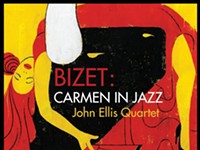
Album Review | 'Bizet: Carmen in Jazz'
Mar 26, 2024 -
'To Swing Is the Thing" by Mike Melito
Aug 10, 2023 - More »
